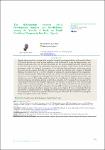The Relationship between Skills Development Support and Self-Reliance among the Youths: A Study on Youth Livelihood Program in Lira City, Uganda
Abstract
Uganda, being one of the youngest with a number of rapidly growing population in the world of about 3.7% annual growth rate, poses a great challenge to the government seeing that approximately one million young people enter into job market annually yet the youth unemployment rate remains stack at 30%. One way to reverse the unfortunate situation was adoption of the robust Youth livelihood programme, which was designed as a response to the high rate of unemployment and poverty among the youths in the country. Initially, the program covered 112 districts with a budget of Uganda Shillings 265 billion from 2014 to 2017 intended to facilitate the implementation of the programme. However available studies indicate that several interventions have been supported by government, the private sector and non-governmental organizations but the rate of youth unemployment and poverty continues to worsen. This study sought to assess the contribution of skills development support towards enhancing self-reliance among youth in Lira city, mid-north Uganda. Focus was put on the relationship between skills development support and self-reliance. A sample of 254 was selected using simple random sampling technique and data were collected using a self-administered questionnaire. Results suggest that youth livelihood program, through skills development support plays a significant role towards ensuring self-reliance among the youths in the region. It was recommended that the government of Uganda rethinks its strategy on poverty reduction among young people from a top-bottom approach to a bottom-up approach where the target beneficiaries take a lead role in the program design, its implementation and evaluation.
Collections
- Research Articles [139]

